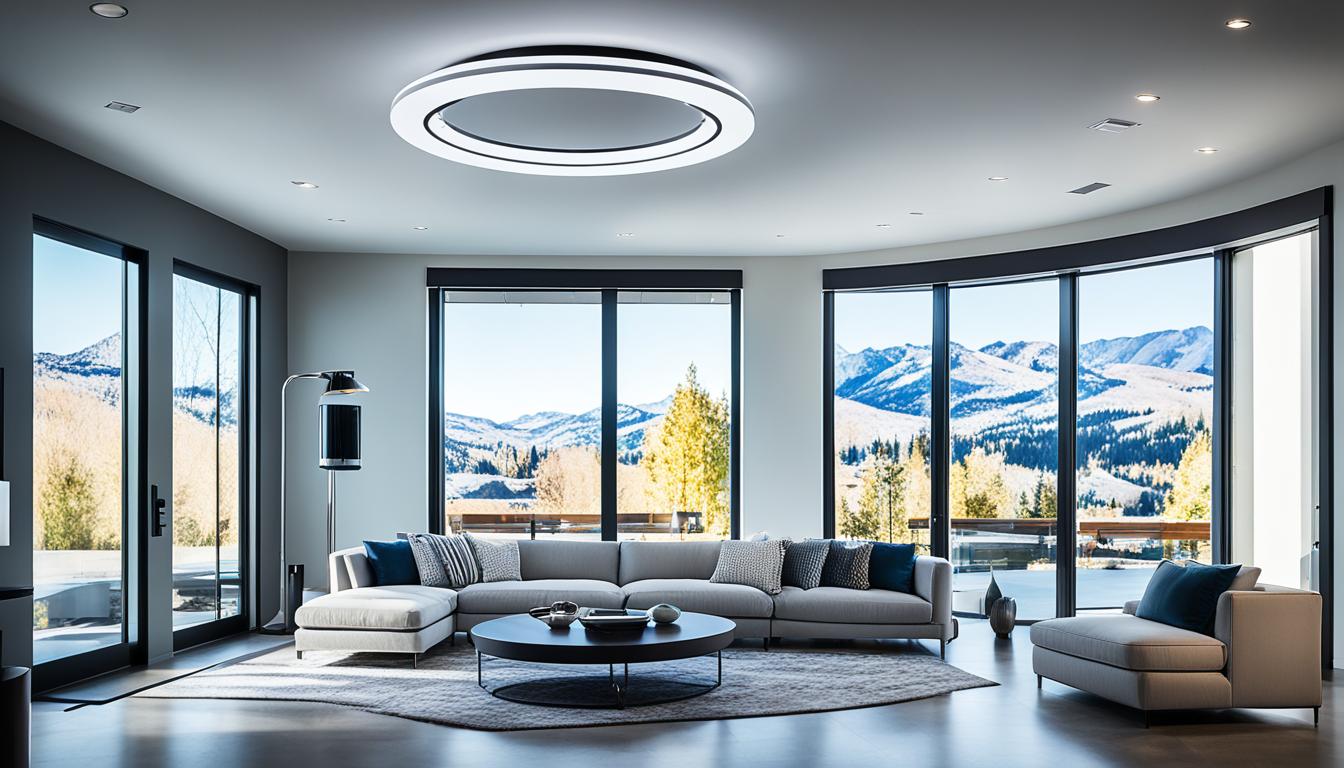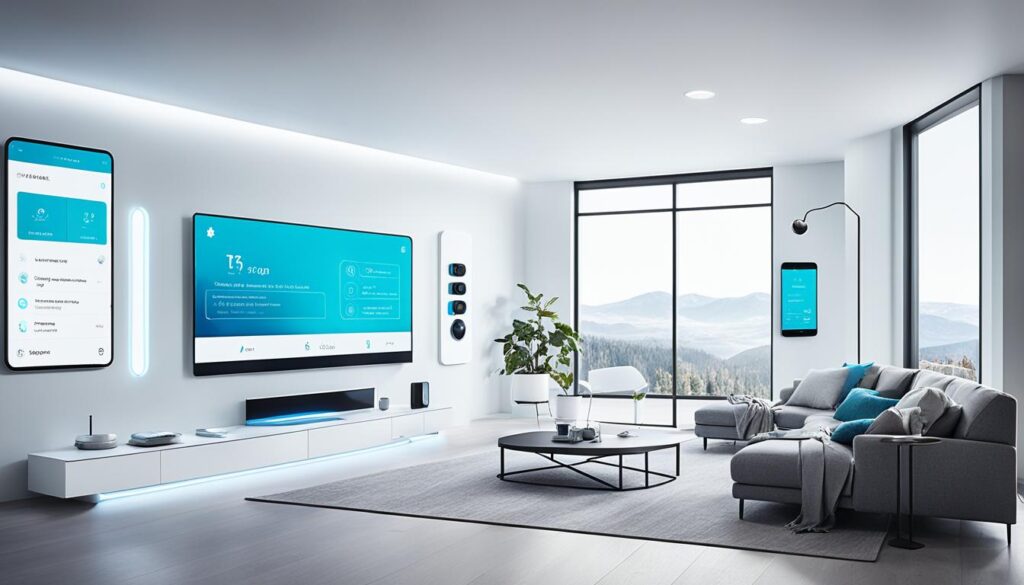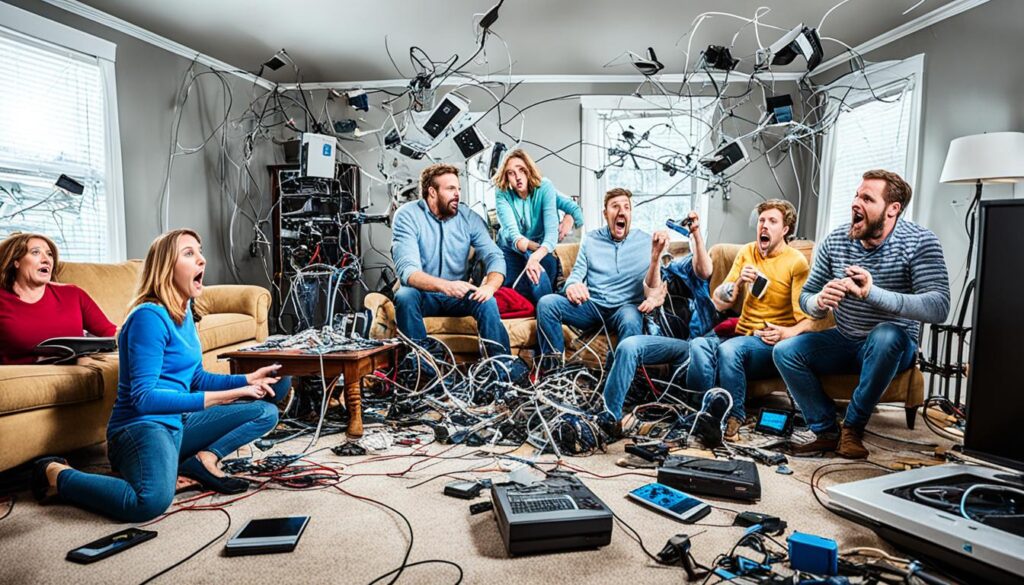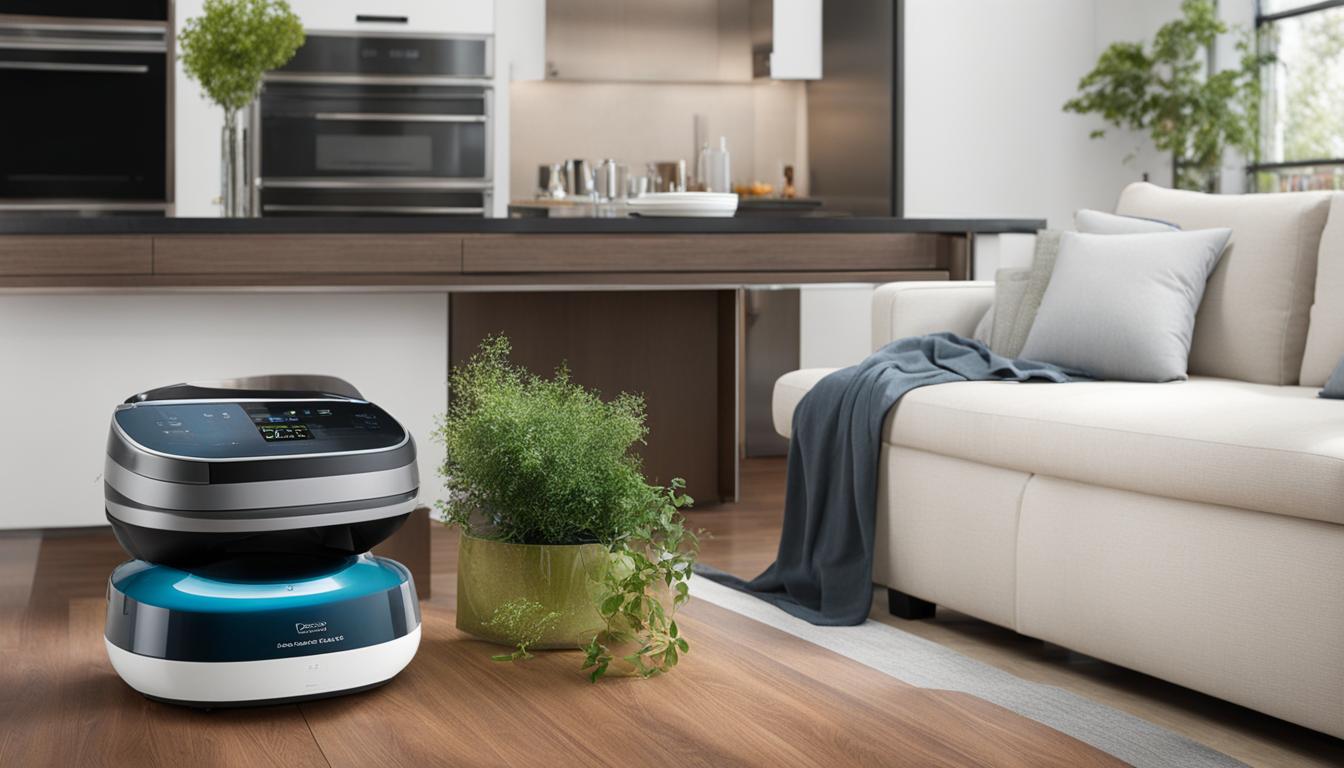
Did you know that over 80 million smart home devices were delivered worldwide in 2016, with a projected increase to 130 million by the end of 2017? That’s a staggering number and a clear indication of the growing popularity of smart home technology.
A smart home refers to a home equipped with a smart home system that connects with various appliances to automate tasks and can be controlled remotely. This technology, also known as home automation, utilizes Internet of Things (IoT) devices to provide homeowners with greater control, convenience, and energy efficiency.
Key Takeaways:
- Smart home technology is on the rise, with millions of devices delivered globally each year.
- A smart home system connects with appliances to automate tasks and can be controlled remotely.
- IoT devices play a crucial role in smart home technology.
- Smart homes offer homeowners greater control, convenience, and energy efficiency.
- The future of smart homes looks promising with advancements in IoT technology.
How Smart Home Technology Works
Smart home technology utilizes internet-connected devices to enable the remote monitoring and management of appliances and systems in a residence. This technology, also known as home automation or domotics, provides homeowners with security, comfort, convenience, and energy efficiency.
Smart devices and systems in a smart home often operate together, exchanging usage data and automating actions based on the preferences of the occupants. A central home automation controller, such as a smart home hub, acts as the control center for all devices and allows homeowners to manage them through a smart home app.
Smart home devices can be programmed to follow schedules or respond to voice commands through home assistants like Amazon Alexa or Google Assistant. Examples of smart home technologies include smart TVs, lighting systems, thermostats, door locks, security cameras, kitchen appliances, and household monitors.


Benefits of a Smart Home
Smart homes offer several benefits to homeowners. Firstly, they provide greater control over energy use, promoting energy efficiency and cost savings. By automating tasks such as adjusting temperature, lighting, and irrigation based on preferences and weather conditions, smart homes optimize energy consumption. This not only reduces unnecessary energy usage but also allows users to identify areas of inefficiency and make informed decisions to save money on utility bills.
In terms of convenience, smart homes enable remote monitoring and control of appliances and systems. Whether you’re at work or on vacation, you can easily manage and monitor your home through smart home apps, ensuring peace of mind and staying connected at all times.
Additionally, smart homes enhance security measures. With features like smart locks, security cameras, and motion sensors, homeowners can keep a close eye on their property, detect and respond to any suspicious activity, and receive real-time notifications. This advanced security system contributes to a safer home environment.


Lastly, smart homes offer significant cost savings. By using resources like water and energy more efficiently, smart homes reduce utility expenses. Automated systems and smart devices help regulate energy consumption, preventing wasteful usage and lowering monthly bills. The long-term financial benefits of a smart home system are particularly appealing to homeowners looking to reduce their carbon footprint and save money in the process.
In summary, the benefits of a smart home extend beyond just convenience. Smart homes promote energy efficiency, enhance security, and unlock cost-saving opportunities for homeowners. With the ability to control and monitor various aspects of your home remotely, investing in a smart home system provides a modern and innovative solution for a better quality of life.
Disadvantages of a Smart Home
While smart homes offer numerous advantages, there are also some disadvantages that need to be taken into consideration. It is important for homeowners to be aware of these drawbacks before fully committing to smart home technology.
1. Compatibility Issues:
A major challenge with smart home technology is the compatibility between devices. Integrating smart devices from different manufacturers can be difficult, leading to a lack of interoperability. This makes it challenging to create a seamless and interconnected system, as different devices may not communicate effectively with each other.
2. Complexity:
The complexity of smart home technology can be overwhelming for some users, especially those who are less technologically inclined. Setting up and configuring multiple devices, managing software updates, and troubleshooting technical issues can require a certain level of technical knowledge and expertise.
3. Cost:
Smart home devices can be costly, and a complete smart home makeover can require a significant investment. The cost of purchasing and installing various devices, as well as any necessary infrastructure updates, can add up quickly. It is important for homeowners to carefully consider their budget and prioritize the devices and features that are most important to them.
4. Reliability:
Reliability can be a concern when it comes to smart home technology. An unreliable internet connection or a network outage can render smart devices inoperable or disrupt their functionality. This can be frustrating for homeowners who rely on their smart devices for everyday tasks and automation.
5. Security Concerns:
Security is a major consideration when it comes to smart homes. IoT devices often lack built-in encryption, making them vulnerable to potential hacking and unauthorized access. Additionally, the collection and transmission of personal data by smart home devices can raise privacy concerns. It is important for homeowners to take necessary precautions to secure their smart home systems and protect their personal information.


The Future of Smart Homes
The future of smart homes holds immense potential, thanks to the rapid advancements in Internet of Things (IoT) technology. As connectivity and device interoperability continue to improve, we can anticipate a more seamless integration of smart devices and enhanced automation capabilities in our homes. This will bring us closer to achieving a truly interconnected and convenient living environment.
One significant development that will shape the future of smart homes is the emergence of new protocols and standards, such as Matter. This initiative aims to enhance compatibility and streamline communication between different smart devices and platforms. With increased standardization, consumers will have greater flexibility in choosing smart devices that work together seamlessly, regardless of the manufacturer or brand.
Energy efficiency and sustainability will also play a crucial role in the future of smart homes. As the world shifts towards cleaner and greener energy sources, smart homes will integrate renewable energy technologies and smart energy management solutions. This will not only reduce carbon footprints but also lead to significant cost savings for homeowners.
Looking ahead, the advancements in smart home technology will make it more accessible, affordable, and user-friendly. As smart homes become increasingly popular, manufacturers will focus on creating intuitive interfaces, simplified installations, and more affordable options. This will make smart home automation a common feature in households around the world, improving our quality of life and transforming the way we live.








